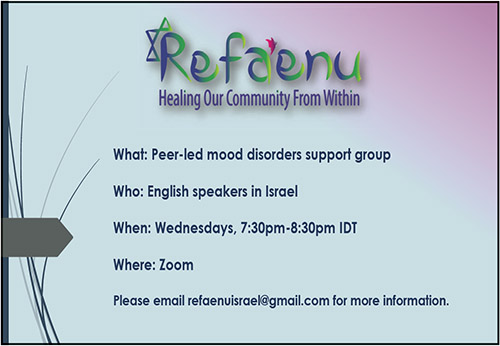
Refa’enu was created to provide two essential resources to the Jewish community: education about and support for those affected by depression and bipolar disorder as well as other behavioral health issues. Refa’enu’s mission is realized through educational outreach and ongoing peer-led support groups, now expanded to include participants in Israel. The support component is for those who have these mood disorders, as well as their loved ones; and there are groups for each. Especially important, Refa’enu’s efforts also focus on dispelling disorder-related stigmas that can impede appropriate care and management.
Refa’enu has an operational history that extends back and well before the attainment of nonprofit status in 2014. Dena Croog Cohen, founder, executive director and peer facilitator of Refa’enu, explained: “Back in 2004, following the suicide of a friend from college, I was on a mission to create an educational program that would address depression in the Jewish community. Soon my own decade-long struggle with an undiagnosed mood disorder culminated in a mixed mood episode and subsequent diagnosis of bipolar disorder. I put my ideas on hold so that I could pick up the pieces of my life following that horrible episode. I attended a peer-led support group in Manhattan for people with depression and bipolar disorder.
“Seeing how much I benefited from being in the group and having caught the eye of one of the facilitators, I was asked if I wanted to train to become a facilitator.” Cohen continued to monitor what was happening in the Jewish community in terms of mental health education and support, and eventually decided it was time to bring her original ideas to fruition.
Following an attempt at an online support group in 2012, Cohen decided to form a board of trustees consisting of people she had networked with, some of whom had been involved in the organization’s inception for years. These founding trustees included Ira Friedman, JD; Hannah Rothstein, PhD; Ruth Roth; David Yammer, PhD; and Jeff Berman, MD, DFASAM; and Mendy Schwartz, who was instrumental in the process of obtaining nonprofit status as a 501(c)(3) in 2014. They also later added like-minded board members, among them David Drapkin, LCSW; and Deborah Douek, MS Ed, ATR-BC, ATCS, LCAT, CCLS. Refa’enu also has an advisory board, and coinciding with the creation of Refa’enu, Cohen made public her own bipolar condition in a column in February 2014. The first peer-led support groups began meeting in Paramus, in November 2014, with two groups led by volunteer peer facilitators: one for people with a mood disorder (depression or bipolar disorder) and one for family members of people with mood disorders. The groups ran biweekly, until 2020 when they switched to meeting weekly on Zoom due to the pandemic.
Refa’enu’s mission of education and support also involves some landmark mental health initiatives, including hosting mental health first aid courses, co-hosting programs with a substance abuse organization (CCSA) in-person and online, and via educational events at schools. Forced to turn to Zoom during the pandemic, Cohen found that it actually expanded their reach, because they were able to accommodate participants outside of Bergen County and the New York-New Jersey area. Now there are participants from all over the United States, and international participants as well. The incorporation of Zoom also allowed for more frequent meetings and facilitated the ability to branch out even further by bringing in the Israel peer-led support group for English speakers with mood disorders. Going forward, they plan to continue this two-fold mission.
Miriam Greenberg, Israel’s group peer facilitator explained why group work is so important with mood disorders. “The added value of peer-led support is that participants are discussing things that are relatable to others in the group. Our attendees benefit from both getting and giving support. It’s a great feeling when you’re able to contribute something that will help someone else! This reciprocity is unique to a group of peers, compared to a one-on-one relationship with a mental health professional.”
Greenberg also stressed that Refa’enu groups are not a substitute for competent, professional care. The groups can serve as a “booster” to counseling, medication and self-care. Group participants begin the process by sending an email to refaenuisrael@gmail.com. There is an exchange of some basic information to determine if the group and prospective participants are likely to be a good fit. Next, participants are provided with login information for the Zoom meeting each week.
“At the beginning of each session, we go over some rules and guidelines. Some of the key points we highlight include the following: We are a group of peers; the group is a confidential, respectful, safe, and a judgment-free zone; while the group is confidential, it is not anonymous and, therefore, cameras need to stay on; people are at different places religiously, and we respect that; people are at different places emotionally in their healing and management; speaking and sharing are encouraged for everyone but are not mandatory; when offering support, we don’t tell people what to do. Instead, we suggest what might work.”
Benefits of group work noted on the website are: Groups offer an alternative to isolation and help foster a sense of real belonging; they foster hope and empowerment in an encouraging environment; they allow peers in different stages of their illness and recovery to share their most private concerns and feelings in a safe environment; they provide a forum for those suffering from the illness to feel heard, find empathy, solace and reassurance; they reveal successful experiences with treatment and recovery approaches, and important long-term coping strategies; they help restore self-respect, self-acceptance, and belief in the possibility of getting and staying well; they encourage the motivation and determination required for taking charge of the illness.
Groups meet for an hour on Wednesdays at 7:30 p.m., Israel time, and are free of charge. For more information or to become involved with one of the groups, reach out to refaenuisrael@gmail.com
By Ellie Wolf












